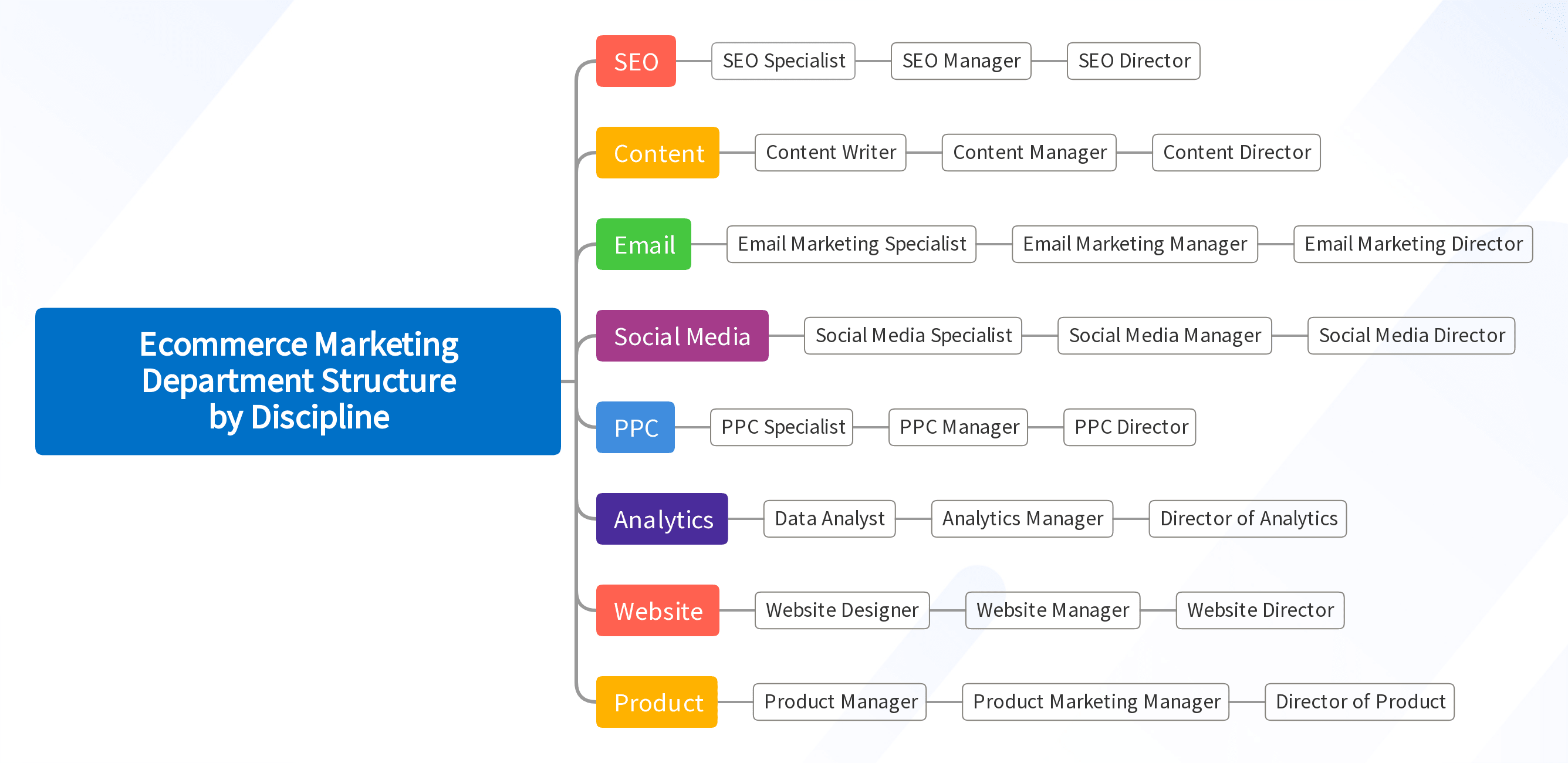

Navigating the digital marketplace requires a robust Ecommerce Marketing team. Their role is pivotal in the fast-paced online business landscape.
They strategize, execute, and drive growth, making them indispensable assets. Understanding their structure can pave the way for success. We've learned this firsthand while growing our own marketing agency, GrantSpark.
But first, let's talk about the Ecommerce Marketing department structures you have to choose from.
Best for Growth Marketers
Best for Paid Ads & CMO's
Table of Contents
Structuring Ecommerce Marketing Department
There are two main types of department structures based on company size and resources.
- Ecommerce Marketing department structure by discipline
- Org Type: Traditional corporate departments
- Best For: Midsize/Enterprise companies
- Ecommerce Marketing department structure by function
- Org Type: Employees are grouped by activities and objectives
- Best For: Small to Medium Sized Business (SMB)
Let’s go in-depth to each one of them.
1. Ecommerce Marketing Department Structure by Discipline


Discipline-based structure involves building teams centered around various marketing disciplines. For example, SEO, Content, Market Research, and Product Strategy could each form separate teams within a department.
| Discipline | Key Skills | Potential Roles |
|---|---|---|
| SEO | Keyword Research, On-Page SEO, Link Building, SEO Analytics, Technical SEO | SEO Specialist, SEO Manager, SEO Director |
| Content | Copywriting, Editing, Content Planning, Content SEO, Multimedia Content Creation | Content Writer, Content Manager, Content Director |
| Email Design, Email Copywriting, Email Analytics, Marketing Automation, A/B Testing | Email Marketing Specialist, Email Marketing Manager, Email Marketing Director | |
| Social Media | Content Creation, Social Listening, Analytics, Community Management, Paid Social Ads | Social Media Specialist, Social Media Manager, Social Media Director |
| PPC | Keyword Research, PPC Bidding, Conversion Rate Optimization, PPC Analytics, Ad Copywriting | PPC Specialist, PPC Manager, PPC Director |
| Analytics | Data Analysis, Reporting, A/B Testing, Data Visualization, Ecommerce Analytics | Data Analyst, Analytics Manager, Director of Analytics |
| Website | Website Design, UX/UI, Ecommerce Platform Management, Conversion Rate Optimization, A/B Testing | Website Designer, Website Manager, Website Director |
| Product | Product Management, Market Research, Competitive Analysis, Product Marketing, Cross-Functional Leadership | Product Manager, Product Marketing Manager, Director of Product |
2. Ecommerce Marketing Department Structure by Function


Another approach is structuring by function, where teams are formed based on the different functions they perform. For example, promotion, launches, and relationship management could all be separate teams.
| Function | Key Skills | Potential Roles |
|---|---|---|
| Strategy | Ecommerce Strategy, Market Research, Budgeting, ROI Optimization, Cross-Functional Leadership | Ecommerce Strategist, Ecommerce Marketing Manager, Director of Ecommerce |
| Merchandising | Product Selection, Pricing Strategy, Promotional Planning, Customer Experience, Cross-Selling and Up-Selling | Ecommerce Merchandiser, Merchandising Manager, Director of Merchandising |
| Customer Experience | Customer Journey Mapping, UX/UI, Customer Feedback Analysis, A/B Testing, Personalization | Customer Experience Specialist, Customer Experience Manager, Director of Customer Experience |
| Brand | Brand Strategy, Market Positioning, Customer Perception, Brand Communication, Brand Analysis | Brand Specialist, Brand Manager, Brand Director |
| Affiliates | Affiliate Recruitment, Relationship Management, Performance Analysis, Commission Strategies, Affiliate Marketing | Affiliate Specialist, Affiliate Manager, Director of Affiliate Marketing |
| Conversion Optimization | Conversion Rate Optimization, A/B Testing, UX/UI, Sales Funnel Management, Analytics | Conversion Rate Specialist, Conversion Rate Manager, Director of Conversion Optimization |
Ecommerce Marketing Team Size versus Business Scale
To achieve successful marketing outcomes, you need to align the team size with your business's scale – a strategic approach that helps optimize resources and drive targeted growth.
| Business Scale | Ideal Department Size | Explanation |
|---|---|---|
| Start-up | 1-3 | Limited resources necessitate a lean, multi-skilled team. |
| Small-Medium Business | 4-8 | More resources allow for specialization, improving campaign effectiveness. |
| Large Enterprise | 9+ | Vast operations require a large team for diverse marketing needs. |
Factors to Consider When Deciding On an eCommerce Marketing Department Structure
- Business Goals: Understand your business objectives first. This will help guide your decision on the structure of your marketing team. This could be anything from increasing brand awareness, driving sales, or improving customer satisfaction.
- Team Skills: Evaluate the skills and expertise your team already possesses. This could include areas like SEO, content creation, social media management, and data analysis. The skills of your team will determine which roles are necessary and which are not.
- Budget Allocation: Consider how much you are willing to invest in your marketing team. This will affect the number of team members you can hire, the technology you use, and the scale of your campaigns.
- Customer Behavior: Understand your target audience and their behavior. This includes their purchasing habits, preferred social media platforms, and the type of content they engage with. This information will help you tailor your marketing strategies.
- Industry Trends: Stay updated with the latest trends in ecommerce marketing. The digital marketing landscape is always changing, and staying ahead of these trends can give your business a competitive edge.
Explore other marketing departments:
So, there you have it, a detailed overview of an eCommerce Marketing team structure. From the essence of the team and key roles, to structuring and optimizing; every aspect tailored to achieve success on your business blueprint.



















